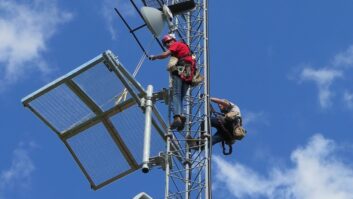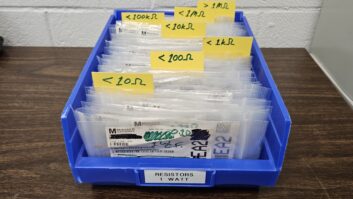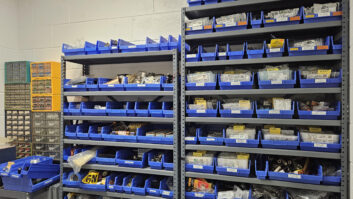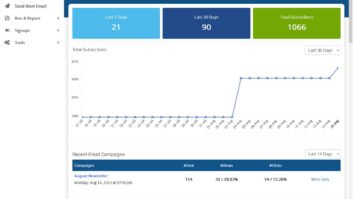(click thumbnail)WASHINGTON The threat of biological weapons targeted at some U.S. media companies drove several radio networks and group owners to take added precautions.
Mailroom personnel at many radio stations donned protective gloves and masks in recent weeks after traces of anthrax spores were found on pieces of mail sent to the offices of television news anchors Tom Brokaw and Dan Rather and following several anthrax-related deaths.
While reports increased of the bacteria being detected on pieces of mail sent to members of Congress and about 20 federal buildings in the nation’s capital, including the Voice of America, stations took precautions to protect employees.
Soon after the incidents, most media companies began following the procedures set out by the U.S. Postal Service and the FBI detailing how suspicious mail should be handled. Both organizations advised companies to scrutinize mail carefully for signs of tampering or suspicious contents, including strange odors, poor handwriting, excessive postage, an unusual return address or no return address. In addition, many companies invested in industrial gloves and masks for their mailroom employees.
Several radio companies, including CBS/Infinity and ABC Radio Networks, stopped mail delivery for one day in mid-October following the first incident at the NBC office of Tom Brokaw.
On Oct. 15, CBS/Infinity Radio, housed in a separate building from the one that houses Rather’s office, began to sort all inbound mail in an enclosed area using protective equipment, said spokeswoman Kim Sartori.
All business mail was examined and distributed, while packages, listener mail and correspondence addressed to specific employees were opened and inspected. She said employees were being asked to identify personal or confidential mail before it was given to them.
Though the benefits of the procedures outweighed the disadvantages, Sartori said, the procedures cause a slight inconvenience. “Mail is going to be slower,” she said. “There are some unavoidable delays.”
According to ABC spokeswoman Julie Hoover, ABC halted network mail distribution for one day and then resumed operations the next day following the federal procedures.
The mail is examined every day and separated into two piles, she said. “Anything that is clearly business mail will be distributed,” she said. “Anything that is not in that category will be held in the mail room.”
Correspondence addressed to an employee was being held in the mailroom and staffers were asked to identify the material before it is given to them, she said. Because of this policy, Hoover said some “fan” mail, correspondence sent by listeners and viewers, would most likely be unopened. The network’s television shows asked viewers to send postcards instead of letters in envelopes.
As for as taking additional steps to protect ABC mailroom staff from anthrax infection, she said the network was considering more changes but could not comment further.
More precautions?
Other radio organizations were taking a wait-and-see approach to making additional changes to mail handling procedures.
NPR also began following the procedures outlined by the postal service, and was evaluating the situation each day to determine whether further changes are needed, said spokeswoman Gretchen Michael.
As of the beginning of November, mail delivery was still slow at NPR’s Washington headquarters. Because the network received its mail from the Brentwood processing plant in the northeast section of the District of Columbia, where two postal workers had died of inhalation anthrax, NPR did not receive mail for almost a week. Soon after, the network started to receive mail originating from a plant in southern Maryland.
NPR began asking listeners to send faxes and e-mail instead of letters, Michael said.
Emmis Communications left the decision of what to do with listener mail to each of its 23 radio stations, said spokeswoman Kate Healey.
Though the staff distributed information from the postal service and the FBI to each of Emmis stations, each set up its own security procedures.
Healey said all the stations instructed employees that handle mail to use gloves and masks and increased general security. Some stations went decided to confine mail sorting to one area, put one person in charge of the sorting or restrict mail delivery to early-morning hours when the fewest people are at a station.
The stations, she said, have come up with good ideas of their own, which have been shared throughout the group. While morale was high throughout the company, Healey said, “Everyone is being cautious. We’re all in a state of heightened awareness.”













